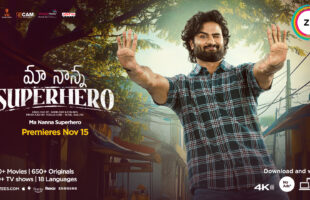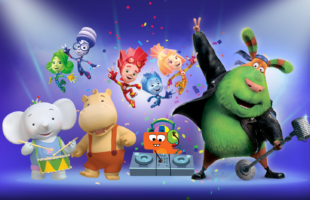Judging from the take-up and renewals of format brands in the region, Asian broadcasters are relying on tested formats to attract audiences, and advertisers, in these trying economic times. ITV Studios recently announced the format co-production commission of ITV owned I’m a Celebrity… Get Me Out of Here! for Sony Entertainment Television in India. The news followed NBC’s premiere of the show USA on 1 June, which rated number 1 with all adults aged 18-34 and Sweden’s TV4 autumn commission. The show is a number one rating factual-entertainment series in the UK, recently celebrating its eighth season on leading commercial broadcaster ITV1, delivering a 40 percent share of all primetime eyeballs; it is also aired in over 60 territories worldwide. In India, the 40 x 60 minute format commission is being co-produced by one of India’s largest production houses MidiTech, with ITV Studios’ owned Silverback Productions (Survivor season 2 (TV4), Come Dine With Me season 3 (TV4) and Stable Stars (YLE2).) The format stars ten celebrities who swap their lavish lifestyles for the challenge of surviving in the world’s most inhospitable climate. I’m a Celebrity… Get Me Out of Here! (India) was filmed on location in Malaysia’s Taman Negara rainforest. I’m a Celebrity… Get Me Out of Here! (India) premiered July 2009 on Sony Entertainment Television and broadcast five nights a week in primetime. The series reached an audience in excess of 60 million across India. Gurdip Bhangoo, senior vice president and head of programming for Sony Television in India said, “I’m delighted to add another big-hitting international format to our strong programming line-up. I’m a Celebrity is a hugely successful series that has the potential to draw big audiences in India and across our global footprint. This commission fits our strategy of developing a range of channel defining entertainment shows that have scale and ambition.” James Ross, regional director at ITV Global Entertainment added, “We are very excited about working together with Sony on building the profile in India for a show which is already proven around the world. We think the location in the Malaysian jungle provides an excellent backdrop, as well as testing to the limit the endurance skills of the celebrities. We also believe the India version will be a great pre-cursor to launching the format in other Asian countries, which is already creating strong interest from top broadcasters.” FremantleMedia has seen a number of season renewals, as well as new formats taken up, some in new markets within the region. India’s Got Talent just launched on Viacom 18’s Colors channel, the format having gained considerable momentum since the Susan Boyle phenomenon on You Tube, and Paul Potts before that. FremantleMedia Asia’s CEO Patrick Schult says India is the first market in the region to launch Got Talent, he is optimistic the format will have rolled out in two markets by the end of July and three by the end of 2009. Indian Idol is now in its sixth season on SET India; All Star Athletic Games is airing on POGO; Mamma Mia (under license) performed well on STAR. Indonesia’s Indosiar has picked up dating format Take Me Out (as Take Him Out), which debuted with around 27 percent ratings share and is now delivering 30 percent, despite being up against RCTI’s The Master. Early 2009 saw 21-year old Quoc Thien crowned Vietnam’s second Idol in Ho Chi Minh City, after six months of competition which drew over 15,000 Vietnamese hopefuls. “Idols has discovered another great talent in Asia and we look forward to inviting Quoc Thien to perform as a guest on Idols series across the region”, said Schult. And Family Feud, currently being produced for country-wide syndication with FremantleMedia’s partners in China, is expected to be on air by end of 2009 New for ATF this year is Songs that Make you Cry, licensed by FremantleMedia for all Asia from Japan’s Nippon TV (NTV) in a trend that Schult describes as ‘emo-tainment’. “There is a trend toward programming that helps people be thankful for what they have, despite the recession,” says Schult. “In Australia, there’s a show called Triple Zero Heroes, which not only reconstructs real-life critical situations, featuring the actual call made to the emergency services, but also reunites rescue personnel with the people whose lives they saved. It’s very emotional.” Schult describes Songs that Make you Cry as a “Unique fusion of emotional storytelling and music.” The show features a mixture of sad, and uplifting stories retold, culminating in a song, significant to the story, being performed by a singing star. “It helps remind people to be thankful for what they have, but by the same token we need to ensure there’s a balance, that it’s not just about tragedy, but also about triumph over adversity.” BBC Worldwide’s regional sales and business development director for digital media and formats in Asia Mark Chan, says that Dancing with the Stars is one of BBCW’s key brands in Asia with continuing seasons in China and India. “And we are also in discussions with other Asian broadcasters. We also managed to launch it in Japan, a fundamentally format export country. Top Gear is our other key brand, which has been launched in Australia and Russia and we look forward to having local versions in Asia. Just the Two of Us and Dance Wars have also been telecast in China. Vietnam is a growing market for us with Karaoke Kings and Queens as well as A Question of Sport already launched.” Chan says that Korea is emerging as a new market for format sales, and that China is importing more foreign formats overall and is one of BBCW’s key markets. “Southeast Asia markets such as Vietnam, Indonesia, Thailand and the Philippines continue to be key importers of foreign formats in the region.” “BBC Worldwide is always on the lookout for new and exciting formats from both BBC in-house productions and Indies. Our own development team have also had success developing formats such as the Great American Road Trip which recently aired in the US on NBC. In addition to this we have production bases around the world scouting for the best formats in other territories. Our production base in India has found success with the third series of Jhalak Dikhhla Jaa (Dancing with the Stars) which was the biggest and best series so far for Sony Entertainment Television,” concludes Chan. Endemol Group’s chief executive officer of Asia operations Arjen van Mierlo, agrees that India is a major formats market in the region. “India is currently our most key market, Endemol is one of the leading independent production companies there. Our team in India is producing mainly unscripted formats, dramas and comedies. Big Boss (Big Brother) is in its third season, having had its first run on Sony (SET) it’s now on (Viacom 18’s) Colors channel for which Fear Factor has also done well.” Van Mierlo says Endemol is selling to STAR, Zee, NDTV – and the company is now exploring regional channels in the South of India. “We’re also looking at smaller budget shows; it’s good to differentiate our business and not just depend on our big shows and on the big networks. India isn’t just about song and dance shows for us, but also comedy. Local song and dance is on the decline, and broadcasters are looking at new extreme formats, edgier TV to appeal to a new urban youth with increasing disposable income (the audience that Colors is tapping into) and comedy seems to be an interesting genre for that market.” He also mentions recent initiative Endemol Sports, working with rights owners to better monetize sporting events because rights are so expensive. “One example is Stumped, produced for STAR Cricket, which is a hybrid of talk show with a quiz element, that aired earlier this year.” In China, Hunan picked up 1 VS 100 for 2007-8; Sichuan TV picked up Talpa format I Love my Country in early 2009, as well as International King of Sports. “Even with 2-3 formats in China, we do see an increasing appreciation of the value of formats. We are very positive about China, and see a growing path for us and our peers to do more deals there. SMG is another potential client, as are the bigger provincial and satellite channels such as Dragon TV, SMG, Hunan TV.” And in South Korea, 1 vs 100 in its fourth season on KBS, Deal or no Deal is in that market as well. We have an early footprint there and see a growing interest in formats; government body KBI are taking an interest, and the bigger cable channels are also potential players. Van Mierlo adds that Endemol is always looking for new formats, with around 200-250 formats per year. “Instead of reducing our cost base, we have increased investment in creating new formats by 10 million EUROS, as well as looking at third party content and creativity. We have new formats for MIPCOM, on the slate there’s a format that’s been a big hit in the UK and the US. We are also picking formats from Asia, mainly from Japan.” Over at Sony-owned 2waytraffic, sales director Asia Julian Curtis, shares an update of 2waytraffic’s formats in the region. “Who Wants To Be A Millionaire? is in full revival with one new launch in 2009 and two more in discussion. The Japanese and Vietnamese versions are still performing very strongly. Power of 10 is also doing very well in India, the Philippines and Vietnam,” says Curtis. In terms of new formats gaining ground for 2waytraffic, Curtis continues, “The new spinoff of Who Wants To Be A Millionaire? called Hot Seat is creating a lot of interest. It launched this April in Australia as a daily and has been renewed several times already, due to the fact that it’s garnered the best ratings Nine Network has had in a troublesome yet crucial slot for several years. Ba Ba Boom, in which people have to guess the location of coins hidden under models’ hands to win prizes, will soon be launching in the Philippines. It will be part of an existing show and is our first sale to an independent producer in the territory. Karaoke Showdown in Malaysia launched this year also and has deliviered some good numbers for Media Prima.” “Generally, though, the market is cautious of launching new franchises. Sponsors are looking for surefire hits and luckily we have several of those,” concludes Curtis. activeTV president Michael McKay tends to agree. “Let me dust off my crystal ball here and predict a growing trend towards locally produced proven international formats. Broadcasters will see less risk in putting their money into proven properties. Further down the track the next progression will be more Asian originated formats being exported to the rest of the world.” “I think the next three years will see some of the smaller producers in the market place merging or being swallowed up by some of the larger players. I think this will be in response to economic realities but also the networks wanting more accountability and reliability against their investment. I think funding bodies will need to work more closely with co-productions becoming even more important (as the demand for higher quality and bigger budgets increases). Non-competing Broadcasters in the region will look to work more closely together too, in an effort to achieve some economies of scale. The times ahead are both challenging and exciting,” says McKay. McKay’s activeTV business partner, The Amazing Race’s Bertram van Munster, shares his thoughts on the enduring appeal of proven formats. September 2008 saw The Amazing Race continue to be the sole winner ever of the Primetime Emmy for Outstanding Reality Competition Program, having won it six consecutive years since that Award’s inception. The show’s total seven Primetime Emmys were joined by the Asian Television Award Best Adaptation of an Existing Format for The Amazing Race Asia 3, produced for Sony Pictures Entertainment Asia by activeTV Asia. “The Amazing Race (alongside Survivor) are acknowledged as the two shows that jumpstarted reality TV as we know it,” says van Munster. Now approaching its fifteenth season, van Munster has never missed a single leg of The Amazing Race. “I’m very hands-on, logistically, financially; I like to ensure the quality is not only consistent, but continues to improve – even after so many seasons. The cameras go into the heart of the action – rather than the action being manipulated to suit the cameras.” “We were the first show to have two people competing as a team, rather than individuals pitted against each other. The phrase ‘existing relationship’ is key to a team’s watchability, it’s their chemistry and how they get along under increasing pressure that’s really interesting to watch.” He says it’s also been a huge part of the show’s success, because people’s personalities are revealed much quicker if they are with someone they know (for better or for worse). Sparks flying between estranged couples, siblings, parents and children, the newly-dating and ‘gym-buddies’ has been the staple of The Amazing Race; a format that has remained largely unchanged (apart from a family edition and an all-star version) in its 14 seasons thus far. Far from being staged, van Munster says it’s the sheer unpredictability of the show that has made it such a success, and so nerve-wracking to work on. “Our camera people are the front-line, they are directors in their own right, they have the freedom to go with the action rather than having to wait to be told what to do. If we want to keep reality alive it needs to be less manipulated.” And president of worldwide entertainment at FremantleMedia Rob Clark is asked whether it’s possible to define the ingredients of a great format. “A format is not necessarily what makes something great, it’s a structure in which a story is told. Not just looking at the format – but the content, the emotional impact, the experience of the viewer. The first question I ask (when looking at a format idea), would I want to watch it? The second question, is there a lot of emotional take-out for the viewer? Does the structure work? Does it have a beginning, a middle and an end? With series like Idols, X Factor and Got Talent for example, the structure develops over the season.” Clark joined FremantleMedia’s Worldwide Entertainment division in 2003 and has managed a number of the company’s most successful global roll outs including Got Talent, The X Factor, The Farmer Wants a Wife, The Apprentice, Hole in the Wall, Let’s Dance, and Take Me Out as well as the continued success and roll out of the Idols franchise. He also helped in the re-launch of the Goodson back catalogue of game shows including Family Feud, Password and Price is Right. “A lot of gameshows/reality shows aren’t passive, they are brands you’ve grown up with. About five MIPCOMS ago, we relaunched the gameshow catalogue with the tagline, ‘Welcome back to game-shows.’ I’m not taking credit for everything; it made broadcasters realize that gameshows are very flexible, they can run in primetime, or stripped across a schedule, they are economical to make, they always have a core audience. Price is Right, Family Feud, re-igniting awareness. We also reversioned some shows eg Password (big in the US) is currently big in Indonesia, in Spain it’s a daily strip. Also Card Sharks (aka Play Your Cards Right).” Opines Clark, “If something’s worked at any time, there’s no reason why it won’t work again. Idol, X Factor, Got Talent will not ever disappear, they will be rested (like Family Fortunes). Idols was off-air in Portugal for 5 years but is back on now. Classic reality shows will endure.” Are new format ideas being discovered around the world? “TV is truly global,” says Clark. “Whereas 10 years ago you wouldn’t even think of looking outside of the US and Europe. Asia and Latin America are proving very interesting. Hole in the Wall came from Japan, as did the basic premise of Wipeout, both have travelled globally. It’s not just about having the idea, however, it’s about getting a big launch network eg BBC/ITV, the US. So there are still centres of (format-creation) excellence in Europe and the US because that’s where the big launch networks are,” he says. Asked whether formats can ever reach saturation point, “Can entertainment TV, the story of people’s lives, ever reach a saturation point? If I genuinely thought ideas were finite, I’d be looking for a new job. That’s a typical journalist’s attitude, I remember the press saying we’d never again have singing, dancing, music in primetime – they reported the end of variety shows in primetime. But look at the schedules now!” “A format is only the way of telling the story. Variety was only dead insofar as the way it was being told, now the audiences are people that have never seen ‘traditional’ variety shows. Now there’s a modern approach to variety. And the audience profile now is almost the opposite of the audiences of traditional variety shows.”
Ad – Before Content
Related Articles
ZEE5 Global announces the digital premiere of Telugu blockbuster Maa Nanna Superhero
Citadel: Honey Bunny Was Prime Video’s Most Watched Series Globally This Weekend
BBC World Service announces new six-part audio drama Purple Heart Warriors
Animotion Media Group Signs Exclusive Deal with ADA
- Banijay Rights Appoints Sarah Mottershead as VP for Middle East, Africa, Israel, Greece & Cyprus
Sarah Mottershead as VP for Middle East, Africa, Israel, Greece & Cyprus
TelevisaUnivision partners with Anima Kitchent to broadcast Cleo & Cuquin







